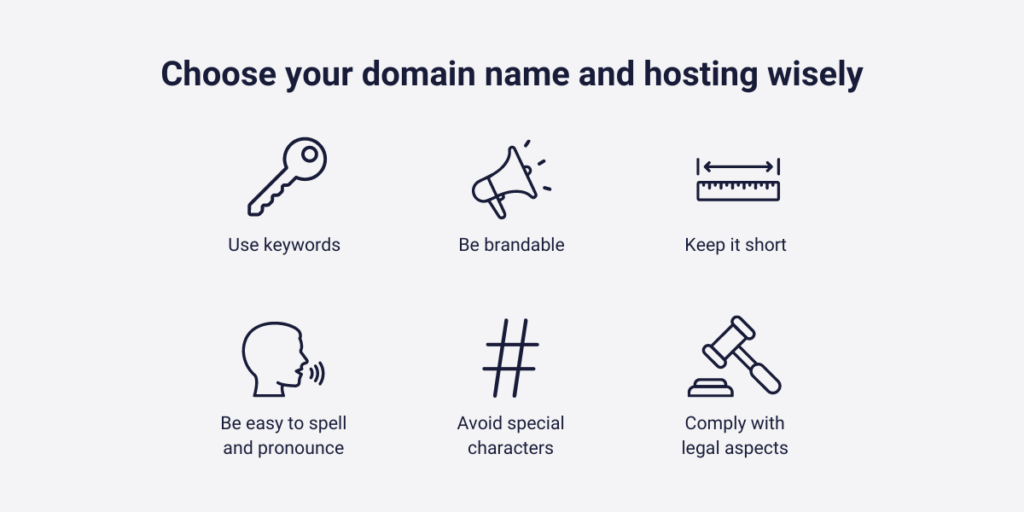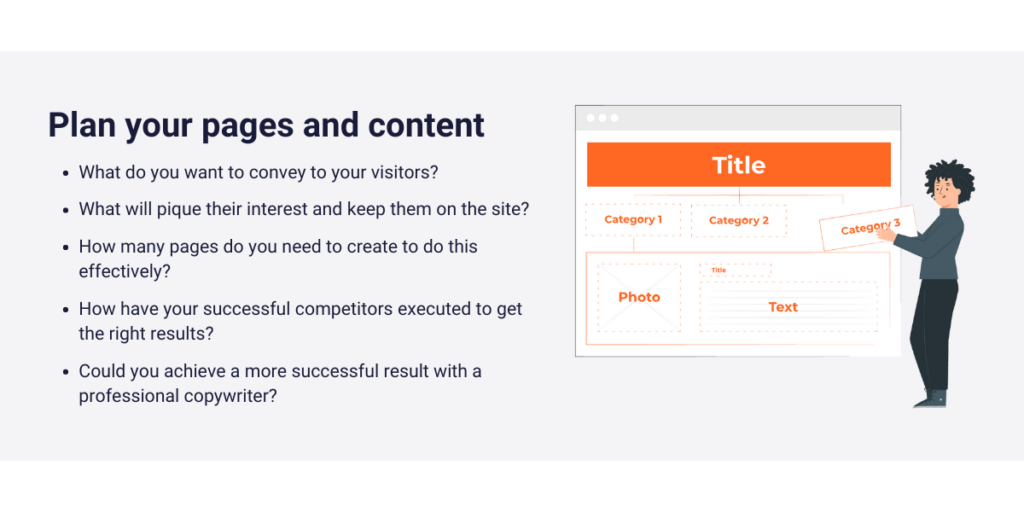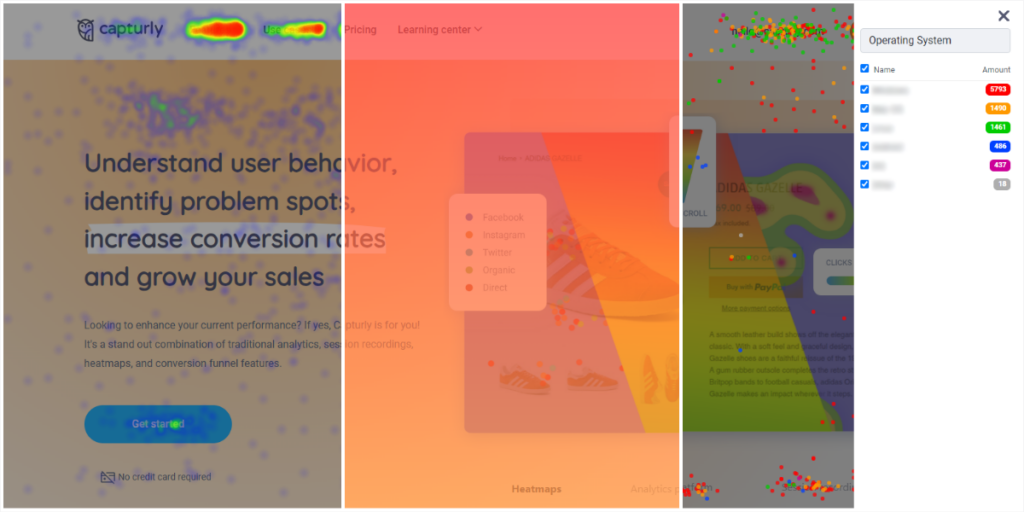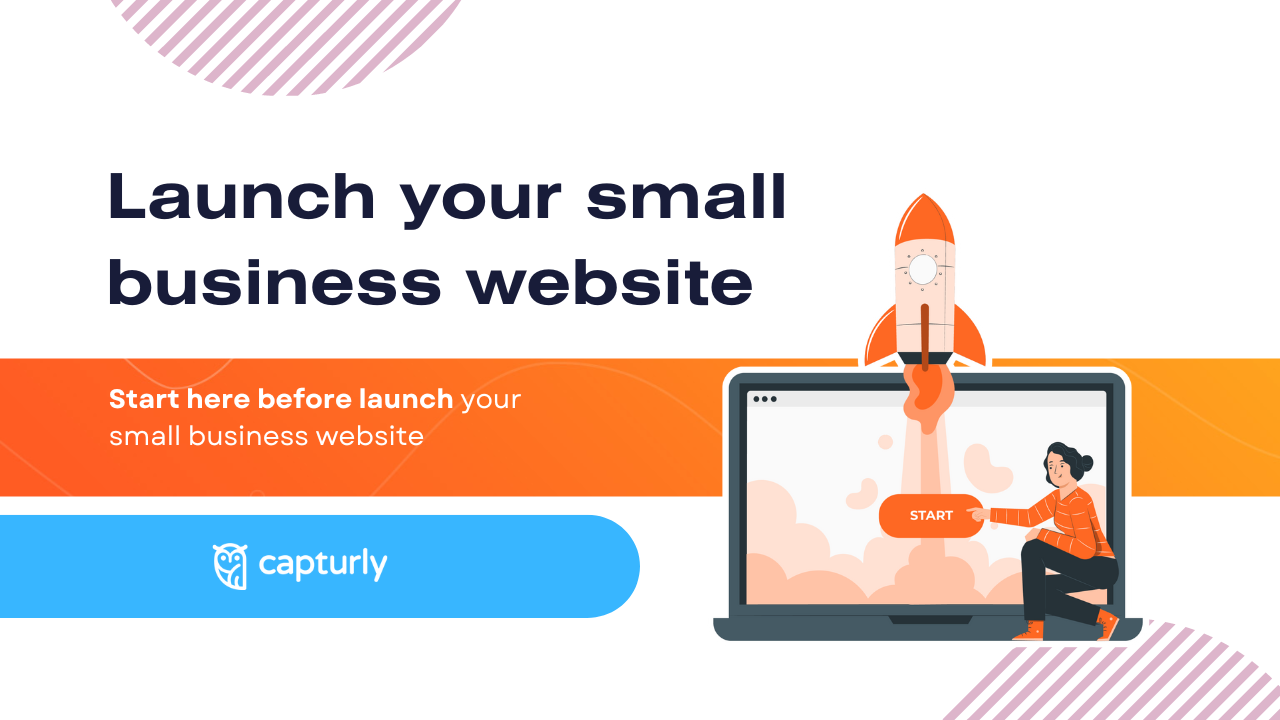Want to start building a small business website, but don’t know where to start?
Many entrepreneurs fall into the common mistake of going into business with the first website builder they find – preferably the cheapest one – or even starting themselves, but without the knowledge to check that they have built a website that meets their needs and objectives.
It is therefore advisable to clarify your expectations before you build a website so that you can have a truly successful website.
That’s why in this article we have put together some important elements without which you cannot hope to have a small business website that meets your expectations.
Table of Contents
1. Have a strategy and do market research
The very first and indispensable step for a small business website builder is to be clear about the specific purpose for which you want to use the website.
- Who will be aimed at target audience research to determine design elements and communication?
- What it will be about defining the business’s identity and its goals and strategy.
- Against whom we will level up: competitor research – what website and communications are needed to achieve our goals. What are your competitors doing? What are they good at? What are they bad at?
2. Choose your domain name and hosting wisely
You must choose the right domain name for you. It used to matter that it contained your main keyword, but today the algorithms are much smarter and the focus is on branding. What you should look out for is that it shouldn’t even be confusable with your competitors – unless that’s your goal. So the same domain name, just with a different extension, for example .eu instead of .com.
There are several free or very low-budget hosting providers on the market, but the first step when choosing a provider is to seek the opinion of a professional to determine the resource requirements of the website you are building.
The domain name will be your business’s online address. It’s what visitors will remember, what they will associate with, what they will come back to. It is worth taking the time to decide and consider your options. You can gain a serious advantage with a well-chosen name.

Let’s look at the considerations and methods for finding and choosing the best domain names:
Use keywords
Start brainstorming with the name of your business, your field of activity, and closely related words. If you can create a domain name that people associate with your business and hasn’t already been bought by someone else, you could have a winning case.
Be brandable
A brandable domain name stands out from the crowd, is easy to remember, easy to pronounce, and exudes trustworthiness.
In other words, it is not simply a combination of keywords. It is not similar to your competitors’ solutions. It is not overly complex and not at all ambiguous in its interpretation.
Keep it short
It’s worth aiming to be under 14-15 characters. Even without memorability and unorthodox writing styles, this is on the borderline of capability. In this case, there is a good chance that more popular endings are available.
Be easy to spell and pronounce
You need to ensure that visitors can visit your website easily and without thinking twice. If you have to explain your domain’s spelling more than once, you’ve probably made the wrong choice.
You need to be able to share the contact details of your website as easily in words as you do in writing. It makes promotion much easier if you don’t have to pronounce a tongue twister.
Avoid special characters
Reflecting on the previous two points, I would point out that you should avoid using hyphens. It makes both typing and pronunciation much easier.
You should also avoid using numbers unless you have a well-known brand name with a number name, as you will always be asked whether you should write with a number or a letter.
Comply with legal aspects
The last thing you should do is choose a name that is too similar to a brand name owned by someone else. This is especially problematic if you have an established website and someone comes to you and sues you for trademark infringement.
3. Choose the best web hosting provider for you before you launch your small business website
Without a web hosting service, elements such as text, images, videos, and any other content that belongs to our small business website would not be able to appear in the browser window of our visitors when they arrive at our website.
The hosting provider is also responsible for the ongoing operation of the server hosting our website and, to some extent, for the security of our site. Web hosting is therefore an online service that allows our website to appear on the Internet.
In effect, we rent some hosting space on a physical server, which is sufficient to keep our website running smoothly. The continuous operation of the server ensures that our website is available and accessible at all times.
It is also possible to run a website on your own, but this requires extensive IT skills and we have to set up the web server from scratch, including the equipment and computer needed to run it. Of course, we should not forget about maintenance.
How complicated and cumbersome does it sound? That’s why it’s good to have a hosting service that ensures the optimal and secure operation of your website.
4. Start bringing your small business website to life
Before you launch your small business website, it can be important to consider some content, design, copywriting, and content layout techniques to be a successful small business website owner.
So let’s take a look at how to breathe life into and properly structure your small business website with content, design elements, text, and images.
Plan your pages and content before launch your small business website
- What do you want to convey to your visitors?
- What will pique their interest and keep them on the site?
- How many pages do you need to create to do this effectively?
- How have your successful competitors executed to get the right results?
- Could you achieve a more successful result with a professional copywriter?

Have a consistent look and feel for your small business website
In most cases, your logo defines the look and feel of your website. Its colors, its style, all reflect the credo of your business, and you’ll be looking at it for the next decade – for good. What’s more, it’s not you who needs to like it, it’s your customers. Many entrepreneurs find it hard to get over this, even though a lot depends on it.
The vast majority of users open and keep open multiple tabs while browsing. Not only do we degrade the user experience by not knowing poor people where to click (using a favicon) when they want to return to our website, but we also defer the opportunity to burn our branding into their consciousness. Customer retention for small business websites is a priority, as retaining customers is much more cost-effective than acquiring new ones.
Watch your internal content too
If you’re just launching your small business website, it’s good to know that your main site isn’t the only thing out there. Your subpages play an equally important role in your visibility.
If they contain important information but are underperforming in Google’s eyes, it’s worth sharing them on social platforms and making them invisible to Google so they don’t diminish your website’s credibility. Or develop the content naturally…
It’s also worth linking to this content, which will give the visitor more useful information, help Google to identify the structure of your website more clearly, and even increase the length of time spent on your website.
Forget keyword stacking
Stacking keywords on a small business website was once an effective practice. Google’s algorithm is extremely effective in identifying pages that contain keywords with inappropriate keyword density, which in some cases can even lead to the removal of the page from Google’s search results.
The reason is very simple: you can’t have user-friendly content that repeats the same words over and over and over again. And Google wants to benefit users. Everything else is Mastercard and paid advertising.
5. Don’t launch your small business website without search engine optimization
Your website is finished and looks great, is easy to navigate, and provides a highly enjoyable browsing experience. Great!
However, if you don’t build it on SEO elements, it can easily get lost in the vast ocean of the internet. When designing a website, it’s worth consulting an SEO expert if you don’t want your website to end up like a drowned online axe that quickly sinks into the digital water. It’s a good idea to boost your website content with search-engine-optimized text from the outset.
SEO does not start after the website is built, it starts with it!
6. Spend on web analytics tools
The use of web analytics is essential for businesses with an online presence and digital marketing. With accurate and reliable data, you can plan and optimize your online strategies.
This process allows businesses to perform evaluations on their small business website traffic, user behavior, and available data. Web analytics can be used to gather data on how users interact with a business’s online platforms, what path they take, and how they shape the results.
Web analytics tools give you easy access to data that will not only be relevant when you launch your small business website but will also be useful later on. Whether it’s conversion rate tracking, mapping out the underperforming pages on your site, or a customer survey.

Conversion analysis
To increase your small business website’s conversion rate you may want to pay attention to how your website is performing against your original expectations and objectives.
Web analytics data can be used to track the conversion process, i.e. what path users take on your website, and what conversions they make (e.g. purchase, subscribe, etc.) This helps you identify the pages or content that are effective in driving conversions, as well as those that can be optimized most effectively.
Therefore, based on the conversion analysis, we can fine-tune our search marketing strategy to increase conversion rates.
Performance monitoring and user experience analysis
With web analytics data, businesses can monitor the performance of their website, including load, bounce rate, and user experience. This is important for optimizing the website and improving the user experience, it also has an impact on search engine rankings.
Take advantage of the heatmap
Heatmap analysis is a useful analytical tool for any business website, whether it’s a webshop or a simple corporate website. However, to get really useful data, you should use it consciously on business-relevant parts of your website.
This could be the landing page of a product or service, which is the main entry point. From these points, you can effectively map what users click on first when they come to your site, and what their behavior pattern is before clicking on a menu item or CTA.

You may want to do the same with your best-performing sub-pages, as you can use the activity here to map out why users prefer them to the rest of your site. And the same goes for underperforming pages, where heatmap analysis can show you what you need to change to improve the user experience.
7. Before you launch your small business website test it
Testing is even more important for an online store, because if there is a bug that stops the purchase or causes the store to malfunction, then most of our hard work has been for nothing. Most website builders test their websites thoroughly before handing them over, but here too the principle of more eyes see more.
Look out for examples such as:
- Spelling mistakes
- Test your website in multiple browsers
- Test the usability of the website
- Periodically test outbound links
- Regularly test your website
With these few small tips in mind, it is worth testing all your websites. Usually, testing a website does not take too much time, but errors on the website can be easily detected using these methods.

+1. Get an account
You shouldn’t have a website built without taking into account the costs involved, otherwise, you could be left with a half-finished or finished but invisible website.
If you want a professional result, you are unlikely to get away with it for a small amount of money. Design, hosting, domain, website design, SEO, copywriting, images, maybe videos, social media…
While there is a cheaper version of every solution, it is worth asking around and comparing what you can or cannot get for that price.
Summary
Is that all it takes to make a small business website? Of course not, but I hope that this much help will be enough to get you started on building your website. You will probably face many more tasks and problems to solve.
But at the end of your work, your reward will be a real website and the sense of achievement that comes with it.
Go for it!
Well, the short answer is no.
To put it in a nutshell, if you’re just building your website, you don’t necessarily need to know HTML, CSS, Javascript, or any other programming language. Of course, if you are interested in website development on a professional level, it is recommended to deepen your programming knowledge.
If you have the enthusiasm and time to build your website, you may want to start on your own. But no, it won’t be free. Sure, it will be cheaper than hiring a professional, but it will never be free. The domain, the plugins used in the website, etc. will all cost money even if you do it yourself or if you hire an expert.
Hosting is the service that makes your website content available on the internet. The idea is to rent a server from a hosting provider to store the files that belong to your website. So you need a hosting space if you want to set up and run a website. However, there are important factors to consider when choosing a hosting provider.
When you start looking for a contractor to develop your website, you may quickly notice that there are hardly any prices listed, and where there are, there is a guide price. In such cases, you may be charged 150% of the guide price at the end of the job. Web development companies/professionals rarely work with open prices as 99% of the time it is all project dependent. The reason for this is very simple. Each website takes different time and expertise to build.
A website can be made for you by many people. I would suggest not necessarily deciding on pricing alone, but rather focusing on the result and whether you can work with the company/web developer. It’s worth looking at the whole process as a team effort, where the common goal is to create an excellent website that will make you money directly or indirectly!
WordPress is an open-source, free content management system. WordPress makes it easy to create, edit, and share content on your website.
Don't forget, sharing is caring! :)

